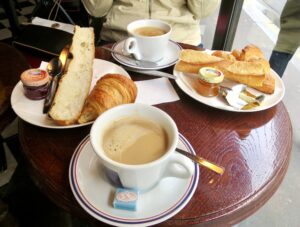
As Jack Nicholson aptly noted, “I don’t think many people have a very good understanding of leisure and the importance it plays in our lives.”
Retirement can be incredibly fulfilling—provided there’s something meaningful to occupy your days. Watching TV, for instance, is not an occupation; it’s merely a stopgap for boredom.
In many countries, cafés serve as vibrant hubs of social life, where people regularly gather to connect and unwind. Unfortunately, the U.S. lacks this tradition. While Starbucks locations abound, they are a pale imitation of the true European café experience.
Starbucks, at its core, is a business driven by revenue rather than a desire to foster community or relaxation. A real café should be an intimate, inviting space where the staff is friendly, knowledgeable, and familiar with their patrons—perhaps even addressing them by name. Its offerings should be fresh and delectable, not stale leftovers from days past.
Ideally, cafés should be independently owned, and run by passionate individuals who prioritize creating a warm and authentic atmosphere over maximizing profit. While profitability is, of course, necessary, it shouldn’t come at the expense of the café’s soul. The founder’s involvement is key to ensuring the space remains true to its purpose.
Sadly, in the Bay Area, the scarcity of intimate cafés and restaurants is striking. Many establishments prioritize “fast food” (a euphemism for mediocre fare), while cafés are often staffed by individuals who seem disengaged, prioritizing their own interests over customer care.
Perhaps this cultural gap explains why so many voters gravitated toward a candidate whose priorities seem to center on swagger and wealth rather than fostering a sense of gemütlichkeit—a German word that embodies warmth, coziness, and community.
It’s time to rethink our café culture. Down with cookie-cutter chains like Starbucks! Let’s champion the rise of authentic, community-focused spaces that bring leisure back to life.
“Tell me how a people uses its leisure, and I will tell you the quality of its civilization.”— Count Maurice Maeterlinck
Alain
